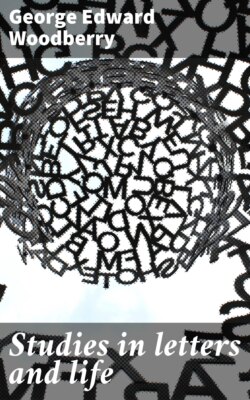Studies in letters and life

Реклама. ООО «ЛитРес», ИНН: 7719571260.
Оглавление
George Edward Woodberry. Studies in letters and life
Studies in letters and life
Table of Contents
Landor
CRITICISMS
Crabbe
On the Promise of Keats
Aubrey de Vere on Poetry
Illustrations of Idealism
Remarks on Shelley
Some Actors' Criticisms of Othello, Iago, and Shylock
Sir George Beaumont, Coleridge, and Wordsworth
Three Men of Piety
Darwin's Life
Byron's Centenary
Browning's Death
Отрывок из книги
George Edward Woodberry
Published by Good Press, 2021
.....
This is perfect; but it is perfect speech, not perfect song. When Landor had something to say at more length, when he had a story to tell, he chose the idyl; and his work in this kind is no less perfect in form than are his quatrains. Indeed, on the idyls his poetic fame will mainly rest. They are very remote from modern life, but the best of them are very beautiful, and in the highest rank of poetry that appeals to the artistic sense. Those who are able still to hold fast to the truth of Greek mythology to the imagination will not willingly let them die. To read them is like looking at the youths and maidens of an ancient bas-relief. The cultivated will never tire of them; the people will never care for them. The limitations of their interest are inherent in their subject and the mode of its presentation; but these limitations do not lessen their beauty, although they make very small the number who appreciate it. Landor's influence over his critics is due chiefly to his power as a stylist, and to the perfection of form in his shorter poems and his idyls; but something is also due to the passages which, apart from those mentioned, they commend so unreservedly; such as the study of incipent insanity in the dialogue between Tiberius and Vipsania, and the scenes from Antony and Octavius where the boy Cæsarion is an actor. Not to be conquered by these argues one's self "dull of soul;" and scattered through the volumes are other passages of only less mastery, especially in the Greek dialogues, which cannot here be particularized. For this reason no author is more served than Landor by a book of selections. After all, too, an author should be judged by his best. Nevertheless, when one remembers the extraordinary gifts of Landor, one cannot but regret the defects of nature and judgment that have so seriously interfered with his influence. His work as a whole exhibits a sadder waste of genius than is the case even with Coleridge. There is no reason to suppose that the verdict of the public on his value will be reversed. His failure may well serve as a warning to the artistic school in poetry; it affords one more of the long list of illustrations of that fundamental truth in literature,—the truth that a man's work is of service to mankind in proportion as, by expressing himself in it, by filling it with his own personality, he fills it with human interest.
I am not come to flatter you and feed.
.....